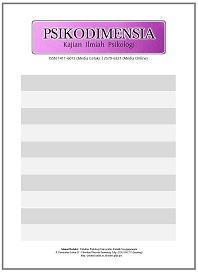Gambaran Resiliensi Transpuan yang Bekerja sebagai Pekerja Seks di Jakarta
Abstract
Abstrak: Penelitian ini bertujuan untuk mendeskripsikan proses pembentukan resiliensi pada pekerja seks transpuan. Penelitian ini merupakan penelitian kualitatif dengan pendekatan. Partisipan dalam penelitian ini adalah tiga pekerja seks transpuan yang telah sepenuhnya atau sebagian membuka identitas seksualnya pada orang tua. Data dikumpulkan melalui wawancara tatap-muka secara mendalam. Hasilnya menunjukkan bahwa tantangan hidup mereka yang paling berat adalah memberitahu orang tua mengenai identitas seksual mereka sebagai transpuan dan pekerjaan mereka sebagai pekerja seks yang berpotensi membahayakan kehidupan mereka. Untuk menangani berbagai tantangan tersebut, partisipan mencoba mencari berbagai sumber daya dan kekuatan yang ada dalam diri mereka. Selain itu mereka juga mengandalkan dukungan keluarga dan rekan sebaya di Sanggar SWARA. Keberhasilan membangun daya lenting (resiliensi) dalam dirinya dan menggalang dukungan sosial akan menentukan kesiapan mereka untuk menghadapi berbagai tantangan tersebut.
Kata kunci: Resiliensi, transpuan, pekerja seks, pendekatan fenomenologi
Abstract: This study aims to describe resiliency process on male-to-female transgender sex workers. This research employed a phenomenological approached implemented through a qualitative methodology. Participants in this study were 3 MTF female transgender sex workers who had fully or partially disclosed their identities. Data was collected through one-on-one interview. The results indicated that the challenges that all participants had to deal with was disclosing their sexual identity to family members and their commercial sex work that potentially might have life threatening consequences. To resolve those challenges, participants resorted to their inner strength and mobilize external psychosocial support from family members and peer group in the workplace and Sanggar SWARA. Successful attempt in developing inner resilience and social supports would prepare them to deal with life adversities.
Keywords: Resiliency, male-to-female transgender, female transgender, sex worker, phenomenological approachKeywords
Full Text:
PDFReferences
American Psychological Association. (2015). Key terms and concepts in understanding gender diversity and sexual orientation among students. Diakses dari: https://www.apa.org/pi/lgbt/ programs/safe-supportive/lgbt/key-terms.pdf
Bennett, L. R., & Davies, S. G. (2015). Sex and sexualities in contemporary indonesia: Sexual politics, health, diversity and representations. New York, NY: Routledge.
Benoit, C., Jansson, S. M., Smith, M., & Flagg, J. (2017). Prostitution stigma and its effect on the working conditions, personal lives, and health of sex workers. The Journal of Sex Research, 1-15. DOI: https://doi.org/10.1080/00224499. 2017.1393652
Bhattacharjya, M., Fulu, E., Murthy, L., Seshu, M. S., Cabassi, J., & Vallejo-Mestres, M. (2015). The right(s) evidence - sex work, violance, and hiv in asia: A multi-country qualitative study. Diakses dari: https://www.aidsdatahub.org/ sites/default/files/documents/new/Rights-Evidence-Report-2015-final.pdf
Burnes, T. R., Long, S. L., & Schept, R. A. (2012). A resilience-based lens of sex work: Implications for professional psychologists. Professional Psychology: Research and Practice, 43(2), 137-144. doi: 10.1037/a0026205
Carroll, J. L. (2019). Sexuality now: Embracing diversity (6th ed). Boston, MA: Cengage Learning.
Castro-Peraza, M. E., García-Acosta, J. M., Delgado, N., Perdomo-Hernández, A. M., Sosa-Alvarez, M. I., Llabrés-Solé, R., & Lorenzo-Rocha, N. D. (2019). Gender identity: The human right of depathologization. International Journal of Environmental Research and Public Health, 16(977), 1-11.
Fedorko, B., & Berredo, L. (2017). The vicious circle of violence: Trans and gender-diverse people, migration, and sex work. Tvt Publication Series, 16, 1-23. Diakses dari: https://transrespect.org/wp-content/uploads/ 2018/01/TvT-PS-Vol16-2017.pdf
Habarth, J. M. (2008). Thinking ‘straight’: Heteronormativity and associated outcomes across sexual orientation. 1-185. Diakses pada 20 September 2019. Diakses dari: https:// deepblue.lib.umich.edu/bitstream/handle/2027.42/60664/jhabarth_1.pdf
Habarth, J. M. (2014). Development of the heteronormative attitudes and beliefs scale. Psychology & Sexuality, 1-23. DOI: http:// dx.doi.org/10.1080/19419899.2013.876444
Katz-Wise, S. L., Ehrensaft, D., Vetters, R., Forcier, M., & Austin, S. B. (2018). Family functioning and mental health of transgender and gender-nonconforming youth in the trans teen and family narratives project. The Journal of Sex Research, 1-9. DOI: 10.1080/00224499.2017. 1415291.
Kumpfer, & Karol, L. (1999). Factors and Processes Contributing to Resilience. Dalam M. Glantz, & J. Johnson, Resilience and Development. New York, NY: Springer US.
Liem, A. (2016). Just tolerance is not enough: A guideline for Indonesian mental health professional working with transgender and intersex clients. Amplify Conference: Born Free 4-6 November 2016, Jakarta.
Nugroho, Y., Nugraha, L. K., Laksmi, S., Amalia, M., Putri, D. A., & Amalia, D. (2012). Media dan Kelompok Rentan di Indonesia: Kisah dari yang Terpinggirkan. (Laporan). Diakses dari: http://cipg.or.id/wp-content/uploads/2015/06/ MEDIA-3-Kelompok-Rentan-2012.pdf
Oetomo, D., Suvianita, K., Halim, K. S., Liang, J., Soeparna, S., dan Surahman, L. (2013). Hidup sebagai lgbt di asia: Laporan nasional indonesia. Diakses dari: https://www.usaid.gov/ sites/default/files/documents/2496/Being_LGBT_in_Asia_Indonesia_Country_Report_Bahasa_language.pdf
Prabawanti, C., Bollen, L., Palupy, R., Morineau, G., Girault, P., Mustikawati, D. E., & Magnani, R. (2011). HIV, sexually transmitted infections, and sexual risk behavior among transgenders in indonesia. AIDS and Behavior, 15(3), 663-673. DOI: 10.1007/s10461-010-9790-0
Praptoraharjo, I., Nevendorff, L., Irwanto, & Puspoarum, T. (2017). Laporan penelitian: Survei kualitas hidup waria di indonesia. 1-30. Diakses pada 20 September 2019. Diakses dari: http://arc-atmajaya.org/download/3980/
Pusat Penelitian Kesehatan Universitas Indonesia. (2015). Pandangan masyarakat terhadap lesbian, gay, biseksual, dan transgender (lgbt) di jakarta, bogor, depok, dan tangerang, 2015. Diakses dari: https://www.kemenpppa.go.id/lib/ uploads/list/0bad8-4-laporan-lgbt masyarakat.pdf
Rokhmansyah, A., Hanum, I. S., & Dahlan, D. (2018). Calabai dan bissu suku bugis: Representasi gender dalam novel calabai karya pepi al-bayqunie. Calls, 4(2), 89-102. DOI: 10.30872/calls.v4i2.1645
Sanchez, F. J., & Vilain, E. (2009). Collective self-esteem as a coping resource for male-to-female transsexuals. Journal of Counseling Psychology, 56(1), 202–209. DOI: https://doi.org/10.1037/a0014573
Steele, L. S., Daley, A., Curling, D., Gibson, M. F., Green, D. C., Williams, C. C., Lori E. Ross, L. E. (2017). Lgbt identity, untreated depression, and unmet need for mental health services by sexual minority women and trans-identified people. Journal Of Women's Health, 26(2), 116-127. DOI: 10.1089/jwh.2015.5677
Suhardjo, K., & Irwanto. (2018). Tumbuh bagai ilalang: Perjalanan transformatif dalam diskriminasi dan kekerasan. Jakarta, Indonesia: Penerbit Universitas Katolik Indonesia Atma Jaya
Undang-Undang Dasar 1945. (2016). Diakses dari: http://www.dpr.go.id/jdih/uu1945
Weitzer, R. (2018). Resistance to sex work stigma. Sexualities, 21(6), 717-729. DOI: 10.1177/ 1363460716684509
Zimman, L. (2009). The other kind of coming out’: Transgender people and the coming out narrative genre. Gender and Language, 3(1), 53-80. DOI: 10.1558/genl.v3i1.53
DOI: https://doi.org/10.24167/psidim.v20i1.2740
Print ISSN : 1411-6073 | online ISSN : 2579-6321 View My Stats

This work is licensed under a Creative Commons Attribution 4.0 International License.




















